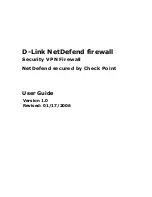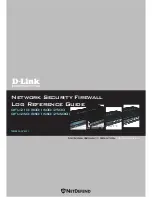
357
Glossary
RAM (Random Access
Memory)
The memory that information required by currently running programs is kept in,
including the program itself. Random access refers to the fact that it can be either read
from or written to by any program. Many operating systems protect critical, occupied, or
reserved RAM locations from tampering.
real-time
An immediate action in response to an event, incident, or alert.
record
To capture and store a set of data that consists of a series of actions and events.
redundancy
See
watchdog process
.
remote access
The use of programs that allow access over the Internet from another computer to gain
information or to attack or alter your computer.
replication
The process of duplicating data from one database to another.
report
A set of data that is collected by Symantec Network Security that allows all types of data to
be selectively examined, scheduled, exported, or printed.
reset
An action that clears any changes made since the last apply or reset action.
reset interface
An interface on a Symantec Network Security 7100 Series appliance through which TCP
resets are sent to stop a malicious TCP/IP flow.
response action
A predefined reaction to an event or alert to a defined security threat, such as capturing
the attacker’s section, triggering tracking, or emailing an alert. Response actions can be
configured for each type of incident that is handled by Symantec Network Security.
response policy
A collection of response rules to react to incidents and events.
response rule
The method of action for handling security risks that is selected from alternatives, given
specific conditions to guide and determine present and future decisions. A logical
statement that lets you respond to an event based on predetermined criteria.
RestrictedUser
An individual with an account that is configured to perform a restricted set of tasks, such
as view reports, and receive alerts. This group and the respective set of permissions is
predefined, and cannot be modified.
rights
See
permissions
.
RIP (Routing
Information Protocol)
The oldest routing protocol on the Internet and the most commonly used routing protocol
on local area IP networks. Routers use RIP to periodically broadcast the networks that they
know how to reach.
risk
The anticipated adverse impact that can result if a threat exploits a vulnerability in an
asset.
rogue program
Any program intended to damage programs or data (such as malicious Trojan horses).
role
An administrative position that is defined by a set of permissions.
Содержание 10521146 - Network Security 7120
Страница 1: ...Symantec Network Security Administration Guide...
Страница 12: ...12 Contents Index...
Страница 14: ...14...
Страница 70: ...70...
Страница 110: ...110 Populating the topology database Adding nodes and objects...
Страница 158: ...158 Responding Managing flow alert rules...
Страница 188: ...188...
Страница 242: ...242 Reporting Playing recorded traffic...
Страница 268: ...268 Managing log files Exporting data...
Страница 316: ...316 Advanced configuration Configuring advanced parameters...
Страница 317: ...Part IV Appendices The following appendices provide additional reference information User groups reference SQL reference...
Страница 318: ...318...
Страница 338: ...338 SQL reference Using MySQL tables...
Страница 366: ...366 Glossary...
Страница 392: ...392 Index...
















































